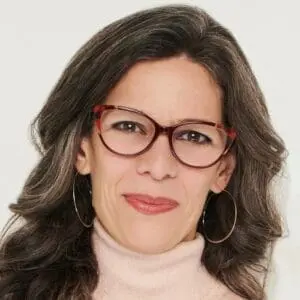It’s 7 p.m. on a Thursday evening, and I’m at an intersection, jogging in place. Typically, urban dance music motivates me to exercise, but I’m not in the mood for music. I’m in the mood for wise words, which I’m hoping a podcast called Wiser Than Me will provide.
Earlier in the day, my doctor informed me that my breast biopsy had come back positive, and I have something called ductal carcinoma in situ—a precancerous condition that required surgery and possibly radiation. The news has unsettled me. I’m disoriented and my body feels strange—like it belongs to someone else. All of a sudden, the familiar identities of writer, spouse, mother, and therapist don’t fit. I’m a person with cancer, now.
Soon, I’ll need to call or text friends and family members, have emotional exchanges, answer questions, schedule an MRI appointment—but not yet. The thought of putting my news into words gives me vertigo. The problem with sharing something scary with other people is that it makes the scary thing true. As long as I can keep it to myself, then it might still be a mistake—a false positive. Plus, I can’t imagine talking about what’s happening, how I’m feeling, or what I’m going to do about it. How would I begin? “I’m scared of dying”? That’s not an ice-breaker—it’s a conversation killer. What I can do, though, is go for a three-mile run around my neighborhood. I can listen to a podcast.
A couple of weeks ago, I saw an Instagram reel of Julia Louis-Dreyfus—of Seinfeld and Veep fame—giving an acceptance speech at the 2024 Webby Awards after Wiser Than Me was selected for Best New Podcast. She holds a trophy, leans toward a mic, and proclaims, with perfect comic timing, “Listen to old women, motherfuckers!” That’s what tipped me off to her latest creative venture, in which she interviews accomplished women who’ve lived a long time and gotten wise from their experiences.
I’ve always known older women are a national resource, one that’s widely underappreciated and underpaid. In every field, in every culture, throughout history, older women have always been unsung spiritual leaders, social change agents, community activists, shamans, healers, nurturers, and public servants. In a youth-and-beauty-obsessed culture, “Listen to old women, motherfuckers” should be a perennial crie de couer. This evening, for me, it’s more than that. It’s personal. I need to hear older women talk about crises they’ve faced and overcome.
In the podcast, Julia Louis-Dreyfus has interviewed dozens of accomplished older women like actress and comedian Carol Burnett, fashion designer Diane von Furstenberg, blues singer Darlene Love, The Joy Luck Club author Amy Tan, and feminist icon Gloria Steinem. When she and her guests talk to each other, they generate a free-floating sense of shared sisterhood—like an all-girls slumber party for women aged 50 to 90. There’s an intimate, conversational flow to the episodes, and it’s easy to forget I’m listening to a recording as I run down a street. I commiserate, wince, laugh.
This evening, I choose an episode with writer Anne Lamott, who’s 70.
Lamott and Louis-Dreyfus talk about aging and different parts of their bodies hurting. Then Lamott says, “By a certain age, we’ve all had unsurvivable losses, right? And I know how you come through them. I know what helps, and I know what doesn’t. Platitudes and nice little Christian bumper stickers don’t help. What works is that you show up, and you sit with a person, and you’re willing to feel like shit with them, and you don’t try to get them to feel any better than they do for as long as it takes.”
This, I realize, is what I’ve tried to get better at as a therapist for most of my career—the art of feeling like shit with people—particularly when my clients are in the white-hot center of a frightening situation, like the one I’m facing now. I’ve always tried to settle into the shared emotional experience of another person’s pain without losing myself in it, but also without jumping to fix it. Just sharing a shitty feeling with someone you trust can be incredibly healing. But it’s hard to share shitty feelings. It’s natural to want to get rid of them, in yourself and others. Right now, listening to older women discuss love, regret, illness, aging, ambition, sex, and death is my way of being with my own shitty feelings.
Now and then, I’ve wished Louis-Dreyfus pushed her guests to go a little deeper with their answers than they do, but then I’ve reminded myself she isn’t a clinician in session intervening with a client. She’s riffing, chatting, and drawing people out. It’s entertainment. There’s joy in quirky, funny moments—like when 82-year-old Isabel Allende, bestselling Chilean-American author of House of Spirits, talks about eating marijuana-infused, chocolate-covered blueberries before getting frisky with her younger husband. There’s tenderness in sad moments—like when 90-year-old actress and political activist Jane Fonda, who starred in films like On Golden Pond—admits to regretting the kind of mother she was. Burdened as women are by outsized societal expectations, what mom can’t relate to that?
I’ve reached the top of a steep hill and rounded a corner. Finally, I feel a little lighter. The endorphins are kicking in. White panicles on a crepe myrtle tree by a local Dunkin’ Donuts have exploded into bloom. For a moment, I marvel at the pleasure of swinging my arms, lifting and lowering my legs, and feeling the sidewalk slap my feet in a way that carries me forward through space. A benefit of fearing death is appreciating life.
Lamott and Louis-Dreyfus talk about how difficult it can be to write a book—an assessment I agree with, having written a few self-help books over the course of my career. Lamott says E.L. Doctorow—the novelist and professor who wrote Ragtime—compared the book-writing process to driving at night with the headlights on: “You can only see a little ways in front of you, but you can make the whole journey that way.” I stop mid-sidewalk, tap the arrow that rewinds the episode, and listen again. It doesn’t just apply to book-writing, I realize. It applies to everything. Do we ever see more than just a little ways in front of us? I don’t think so, although our mind is good at tricking us into thinking we can plan out our entire future. So maybe I can refocus on looking just a little ways ahead of me now. Maybe I can make my whole upcoming cancer journey that way, whatever ends up happening.
“If you could go back in time,” Louis-Dreyfus asks Lamott, “is there something you’d tell yourself at age 21?”I’ve heard her ask other guests this same question. Jane Fonda’s answer was: “No is a complete sentence.” Gloria Steinem’s was: “It’s going to be all right.” Isabel Allende’s was: “Be compassionate with yourself.” My favorite was author Fran Lebowitz’s. She said: “At 21, I’d tell myself, ‘Whatever you do, don’t buy that first apartment.’” Now it’s Lamott’s turn to answer. She says, “I’d tell myself, you are so beautiful as is.” Of course she’s right. All of us are. We just don’t always see ourselves clearly.
The podcast ends with Louis-Dreyfus ringing up her 90-year-old mom. Endearingly, at age fifty-five, she still calls her “mommy.” The two review highlights from the episode, one of which, Louis-Dreyfus shares, is WAIT, an acronym for “Why am I talking” that helps Lamott resist the compulsion to tell her grown son how to live his life. I remove my AirPods, slip them into my pocket, and walk up the front steps of my house. Am I wiser having listened to all that? Probably not. But I’m in my body again, and that’s a good thing.
Alicia Muñoz
Alicia Muñoz, LPC, is a certified couples therapist, and author of several books, including Stop Overthinking Your Relationship, No More Fighting, and A Year of Us. Over the past 18 years, she’s provided individual, group, and couples therapy in clinical settings, including Bellevue Hospital in New York, NY. Muñoz currently works as a senior writer and editor at Psychotherapy Networker. You can learn more about her at www.aliciamunoz.com.












